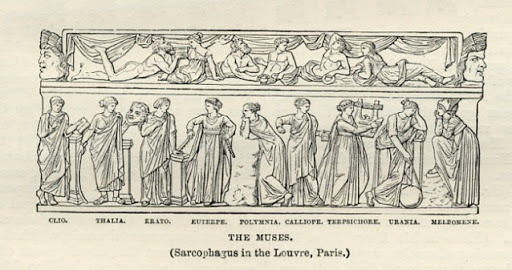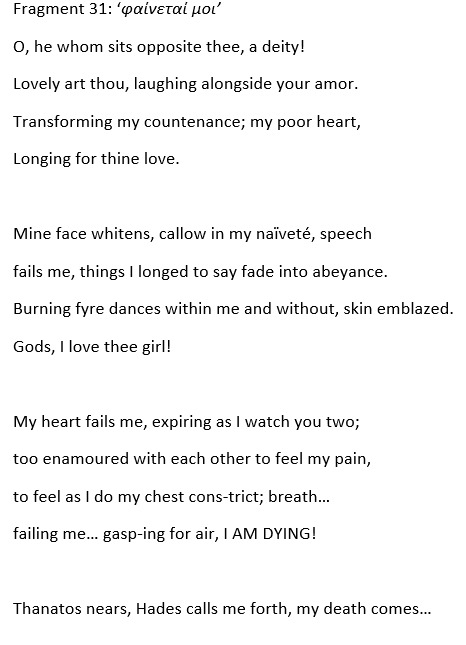#diafotismos
Text

Ανθρωπιστικός Διαφωτισμός και υπερανθρωπιστικά όνειρα https://orthodoxy.rodos-island.gr/anthropistikos-diafotismos-kai-yperanthropistika-oneira/
0 notes
Text
Greek Literature
Henlo there demons, its ya boi, Nyah Lajom.
I'll be talking about Greek literature in this blog and its dominant themes throughout history.
PRE-CLASSICAL PERIOD (800 BC - 500 BC)
The Greeks produced poetry in this period, and the oral tradition handed down myths and legends. Tragedies and comedies appeared, and Greek Literature began.
At the beginning of Greek Literature, we must recall 2 famous authors. The Iliad and Odyssey, both of which are sources of Greek mythology, were written by Homer.
The Iliad tells of the battles and events during the weeks of the quarrel between King Agamemnon and the warrior Achilles, set during the Trojan War, the 10-year siege of the city of Troy by a coalition of Mycenaean Greek.
(ᴛʀᴏʏ ꜱᴛᴏʀʏ 1)

The Odyssey, the poem is divided, as with the Iliad, into 24 volumes. It follows the Greek hero Odysseus, King of Ithaca, and, after the Trojan War, his journey home.
(ᴛʀᴏʏ ꜱᴛᴏʀʏ 2)

Hesiod wrote the Theogony and its all about the Greek Gods and their genealogy. All of these (The Iliad, Odyssey and Theogony) are our main sources about Greek Pantheon.

CLASSICAL PERIOD (500 BC - 323 BC)
Philosophical and theatrical literature emerged during this time. A canonical community of ancient Greek poets revered by the scholars of Hellenistic Alexandria as worthy of critical study were the Nine Lyric Poets.
They were:
Alcman of Sparta (choral lyric, 7th century BC)
Sappho of Lesbos (monodic lyric, c. 600 BC)
Alcaeus of Mytilene (monodic lyric, c. 600 BC)
Anacreon of Teos (monodic lyric, 6th century BC)
Stesichorus of Metauros (choral lyric, 7th century BC)
Ibycus of Rhegium (choral lyric, 6th century BC)
Simonides of Ceos (choral lyric, 6th century BC)
Bacchylides of Ceos (choral lyric, 5th century BC)
Pindar of Thebes (choral lyric, 5th century BC)
In this blog, I will be focusing on Sappho’s work. She is a queer woman and her work provided a rare glimpse into the lives of queer women in ancient Greece.

(Sappho 31)
Playwrights were developed and Philosophical Literature began. The meaning of life was challenged by Plato, Aristotle and Socrates and they wondered about the environment.
They created theories that piqued the interest of people and also helped us because future philosophers and scientists either tried to prove their theories or suggest a new one. It is a never-ending loop of investigation and tests that have contributed to the inventions and expertise of today.
The comedy arose from a ritual in honor of Dionysus. These plays were full of obscenity, abuse, and insult. The surviving plays by Aristophanes are a treasure trove of comic presentation.
For an annual five- or six-day spring festival of dramatic rivalry, Aeschylus, Sophocles, Euripides, and Aristophanes wrote their plays in verse called the Great (or City) Dionysia and dedicated to Dionysus.
In honor of the god Dionysus, Dionysia was a large festival in ancient Athens, the central activities of which were the theatrical performances of dramatic tragedies and comedies from 487 BC. After Panathenaia, it was the second-most important festival.

HELLENISTIC PERIOD (323 BC - 31 BC)
Greek poetry flourished in this era, and pastoral poetry was at its height. The style of poetry mastered by Virgil, the one who wrote The Aeneid, is pastoral poetry.
The New Comedy, in which Menander was the principal exponent, portrayed the drama.
The most precious contribution of the Hellenistic period is said to be the translation into Greek of the Septuagint.

ROMAN PERIOD (31 BC - 284 AD)
In the Roman period, literature in Greek contributed important works to the subjects of poetry, satire, history, and tragedy. Histories were a big proportion of literature from this time.
Eratosthenes of Alexandria wrote on astronomy and geography
In numerous scientific disciplines, including anatomy, physiology, pathology, pharmacology, and neurology, Physician Galen pioneered inventions.
The time in which most of the novels from Ancient Greece were written.
A lot of scripture were written in this era. Including The New Testament, the Gospels and the Epistles of Saint Paul
BYZANTINE PERIOD (290 AD - 1453)
On the shared basis of the Roman political system, Byzantine literature merged Greek and Christian culture. This form of literature was set in the Near East's intellectual and ethnographic atmosphere.
Byzantine Literature was basically a cultural remix of Greek, Christian, Roman and Oriental.
Chronicle and encyclopedias arose in this period.
A chronicle is, as in a time line, a historical record of events structured in chronological order.
An encyclopedia is a reference work or compendium that offers summaries of information from all branches or from a specific area or field.

MODERN GREEK PERIOD (1453 AD - Present)
In this era Modern Greek language is used in literature and it became the norm.
The Diafotismos, a movement that translated the ideas of the European Enlightenment into the Greek world, is greatly influenced by modern Greek literature. Two famous figures from this campaign are Adamantios Korais and Rigas Feraios.
In short, Diafotismos is the Greek version of Renaissance and it greatly influenced modern Greek literature.
Nyah Lajom
4 notes
·
View notes
Text

The Samahan ng mga Mag-aaral ng Teknolohiyang Panlipunan - UPLB in cooperation with the Department of Social Development Services presented Diafotismos, a quiz contest exclusively for SDS 10 students, last March 30,2017 at the CHE Multipurpose Hall .

This is in line with the celebration of SD Week, with the theme "Youth Involvement for Social Development".
0 notes
Photo

Theatre in its western form was born in Greece.[324] The city-state of Classical Athens, which became a significant cultural, political, and military power during this period, was its centre, where it was institutionalised as part of a festival called the Dionysia, which honoured the god Dionysus. Tragedy (late 6th century BC), comedy (486 BC), and the satyr play were the three dramatic genres to emerge there. During the Byzantine period, the theatrical art was heavily declined. According to Marios Ploritis, the only form survived was the folk theatre (Mimos and Pantomimos), despite the hostility of the official state.[325] Later, during the Ottoman period, the main theatrical folk art was the Karagiozis. The renaissance which led to the modern Greek theatre, took place in the Venetian Crete. Significal dramatists include Vitsentzos Kornaros and Georgios Chortatzis. The modern Greek theatre was born after the Greek independence, in the early 19th century, and initially was influenced by the Heptanesean theatre and melodrama, such as the Italian opera. The Nobile Teatro di San Giacomo di Corfù was the first theatre and opera house of modern Greece and the place where the first Greek opera, Spyridon Xyndas’ The Parliamentary Candidate (based on an exclusively Greek libretto) was performed. During the late 19th and early 20th century, the Athenian theatre scene was dominated by revues, musical comedies, operettas and nocturnes and notable playwrights included Spyridon Samaras, Dionysios Lavrangas, Theophrastos Sakellaridis and others. The National Theatre of Greece was opened in 1900 as Royal Theatre.[326] Notable playwrights of the modern Greek theatre include Gregorios Xenopoulos, Nikos Kazantzakis, Pantelis Horn, Alekos Sakellarios and Iakovos Kambanelis, while notable actors include Cybele Andrianou, Marika Kotopouli, Aimilios Veakis, Orestis Makris, Katina Greek literature can be divided into three main categories: Ancient, Byzantine and modern Greek literature.[327] Athens is considered the birthplace of Western literature.[328] At the beginning of Greek literature stand the two monumental works of Homer: the Iliad and the Odyssey. Though dates of composition vary, these works were fixed around 800 BC or after. In the classical period many of the genres of western literature became more prominent. Lyrical poetry, odes, pastorals, elegies, epigrams; dramatic presentations of comedy and tragedy; historiography, rhetorical treatises, philosophical dialectics, and philosophical treatises all arose in this period. The two major lyrical poets were Sappho and Pindar. The Classical era also saw the dawn of drama. Of the hundreds of tragedies written and performed during the classical age, only a limited number of plays by three authors have survived: those of Aeschylus, Sophocles, and Euripides. The surviving plays by Aristophanes are also a treasure trove of comic presentation, while Herodotus and Thucydides are two of the most influential historians in this period. The greatest prose achievement of the 4th century was in philosophy with the works of the three great philosophers. Byzantine literature refers to literature of the Byzantine Empire written in Atticizing, Medieval and early Modern Greek, and it is the expression of the intellectual life of the Byzantine Greeks during the Christian Middle Ages. Although popular Byzantine literature and early Modern Greek literature both began in the 11th century, the two are indistinguishable.[329] Constantine P. Cavafy, whose work was inspired mainly by the Hellenistic past, while Odysseas Elytis (centre) and Giorgos Seferis (right) were representatives of the Generation of the ’30s and Nobel laureates in Literature. Modern Greek literature refers to literature written in common Modern Greek, emerging from late Byzantine times in the 11th century. The Cretan Renaissance poem Erotokritos is undoubtedly the masterpiece of this period of Greek literature. It is a verse romance written around 1600 by Vitsentzos Kornaros (1553–1613). Later, during the period of Greek enlightenment (Diafotismos), writers such as Adamantios Korais and Rigas Feraios prepared with their works the Greek Revolution (1821–1830). Leading figures of modern Greek literature include Dionysios Solomos, Andreas Kalvos, Angelos Sikelianos, Emmanuel Rhoides, Demetrius Vikelas, Kostis Palamas, Penelope Delta, Yannis Ritsos, Alexandros Papadiamantis, Nikos Kazantzakis, Andreas Embeirikos, Kostas Karyotakis, Gregorios Xenopoulos, Constantine P. Cavafy, Nikos Kavvadias, Kostas Varnalis and Kiki Dimoula. Two Greek authors have been awarded the Nobel Prize in Literature: George Seferis in 1963 and Odysseas Elytis in 1979., Manos Katrakis and Dimitris Horn. Significant directors include Dimitris Rontiris, Alexis Minotis and Karolos Koun. Greek literature can be divided into three main categories: Ancient, Byzantine and modern Greek literature.[327] Athens is considered the birthplace of Western literature.[328] At the beginning of Greek literature stand the two monumental works of Homer: the Iliad and the Odyssey. Though dates of composition vary, these works were fixed around 800 BC or after. In the classical period many of the genres of western literature became more prominent. Lyrical poetry, odes, pastorals, elegies, epigrams; dramatic presentations of comedy and tragedy; historiography, rhetorical treatises, philosophical dialectics, and philosophical treatises all arose in this period. The two major lyrical poets were Sappho and Pindar. The Classical era also saw the dawn of drama. Of the hundreds of tragedies written and performed during the classical age, only a limited number of plays by three authors have survived: those of Aeschylus, Sophocles, and Euripides. The surviving plays by Aristophanes are also a treasure trove of comic presentation, while Herodotus and Thucydides are two of the most influential historians in this period. The greatest prose achievement of the 4th century was in philosophy with the works of the three great philosophers. Byzantine literature refers to literature of the Byzantine Empire written in Atticizing, Medieval and early Modern Greek, and it is the expression of the intellectual life of the Byzantine Greeks during the Christian Middle Ages. Although popular Byzantine literature and early Modern Greek literature both began in the 11th century, the two are indistinguishable.[329] Constantine P. Cavafy, whose work was inspired mainly by the Hellenistic past, while Odysseas Elytis (centre) and Giorgos Seferis (right) were representatives of the Generation of the ’30s and Nobel laureates in Literature. Modern Greek literature refers to literature written in common Modern Greek, emerging from late Byzantine times in the 11th century. The Cretan Renaissance poem Erotokritos is undoubtedly the masterpiece of this period of Greek literature. It is a verse romance written around 1600 by Vitsentzos Kornaros (1553–1613). Later, during the period of Greek enlightenment (Diafotismos), writers such as Adamantios Korais and Rigas Feraios prepared with their works the Greek Revolution (1821–1830). Leading figures of modern Greek literature include Dionysios Solomos, Andreas Kalvos, Angelos Sikelianos, Emmanuel Rhoides, Demetrius Vikelas, Kostis Palamas, Penelope Delta, Yannis Ritsos, Alexandros Papadiamantis, Nikos Kazantzakis, Andreas Embeirikos, Kostas Karyotakis, Gregorios Xenopoulos, Constantine P. Cavafy, Nikos Kavvadias, Kostas Varnalis and Kiki Dimoula. Two Greek authors have been awarded the Nobel Prize in Literature: George Seferis in 1963 and Odysseas Elytis in 1979.#tourism#tour#worldtour #bestplace#nature#beauty enjoy#experience#history http://bit.ly/2JXqoKx
0 notes
Text
Do it like Superman | Kostis Zafeirakis | TEDxUniversityofMacedonia (TEDx Talks)
Saturday born. Vegetarian since childhood. Pretty much a journalist. I present the TV show “Apopse kanis bam” on ERT3. From time to time I get up on stage, with my own comedic. My new storytelling performance: “Krouaziera” and before that “Agelades kai Diafotismos”. I’ve gained a lot of experience in everything-Greece, being a vivere pericolosamente […]
Сообщение Do it like Superman | Kostis Zafeirakis | TEDxUniversityofMacedonia (TEDx Talks) появились сначала на Деловидение.
https://delovidenie.com/do-it-like-superman-kostis-zafeirakis-tedxuniversityofmacedonia-tedx-talks/
0 notes